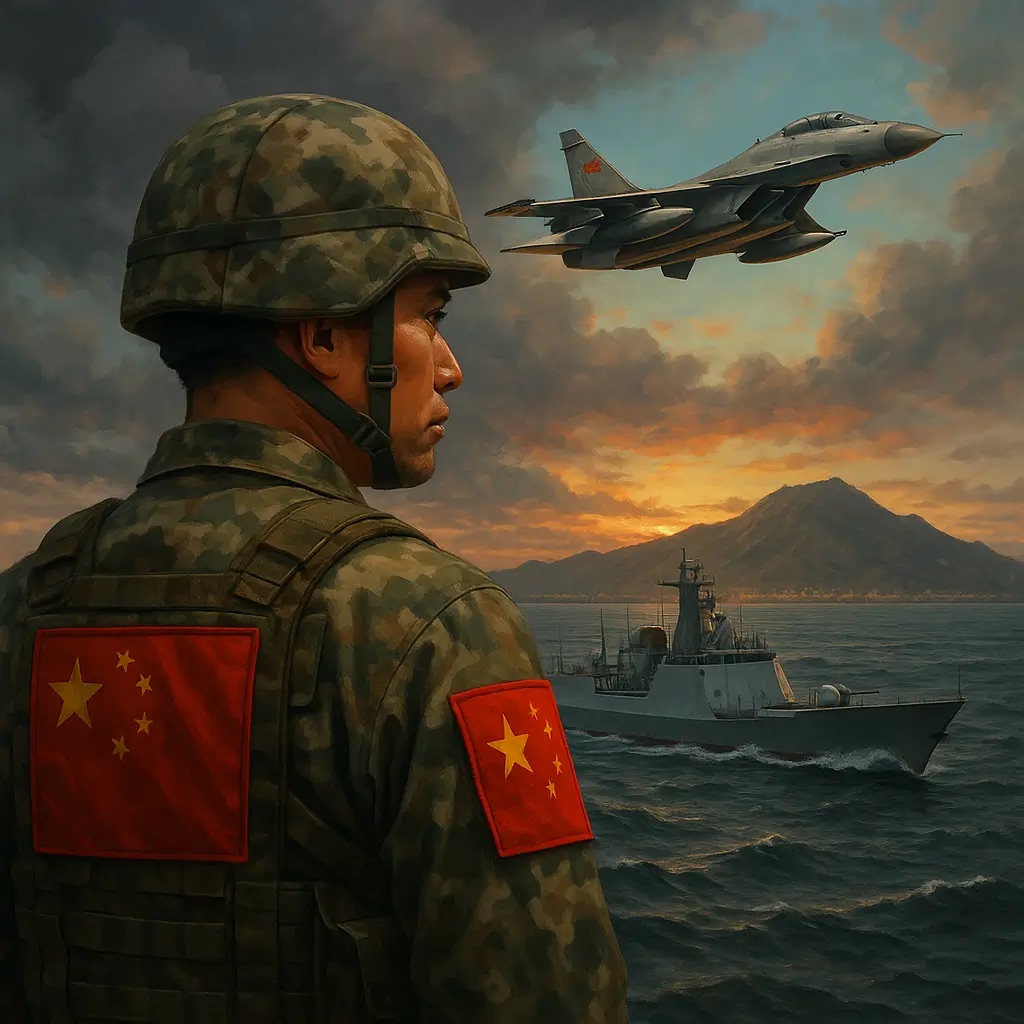China’s recent military maneuvers have reignited global fears: Is Taiwan the next target? With fighter jets crossing the median line, warships patrolling aggressively, and live-fire exercises ramping up, Beijing’s intentions are becoming harder to ignore.
Taiwan, an island of 23 million, sits just 100 miles off the coast of mainland China. For decades, it’s been a democratic thorn in the side of China’s communist leadership, which sees Taiwan as a breakaway province. Now, as China flexes its military muscle, the world is asking — is an invasion next?
Rising Tensions: What’s China Doing?
Over the past year, China has ramped up military activity around Taiwan like never before. These actions go beyond traditional training. They are deliberate, highly publicized displays of force aimed at both Taiwan and the international community.
Airspace Violations and Naval Drills
Chinese warplanes have routinely violated Taiwan’s Air Defense Identification Zone (ADIZ), sometimes with dozens of aircraft in a single day. Fighter jets, bombers, and surveillance planes test Taiwan’s readiness daily.
On the seas, China has sent naval vessels around the island in a near-continuous cycle. These ships simulate blockades and amphibious assaults, often operating just miles away from Taiwanese waters.
Is This Just Saber-Rattling or Something More?
While military drills are not new, the scale, intensity, and frequency of these operations are unprecedented. Analysts believe China is practicing for a potential blockade or full-scale invasion — and using these drills as preparation and psychological warfare.
Psychological Pressure on Taiwan
Beijing’s strategy isn’t just about firepower. It’s about breaking Taiwan’s will. By creating a sense of constant threat, China hopes to weaken the morale of Taiwan’s population and leadership, nudging them toward concessions or surrender.
The Xi Jinping Factor
President Xi Jinping has made “reunification with Taiwan” a central pillar of his leadership. With China’s economy slowing and domestic pressure rising, Xi may see nationalist moves — like “reclaiming” Taiwan — as a way to strengthen his grip on power.
Could China Invade Taiwan?
The possibility of a Chinese invasion is no longer just a theoretical discussion — it’s a very real concern for military planners worldwide.
Strategic Scenarios
Experts outline three main paths China could take:
Air and Naval Blockade: Cutting Taiwan off from global trade routes. Limited Strikes: Targeting military installations to cripple Taiwan’s defenses. Full-Scale Invasion: Amphibious landings and occupation — the most difficult and dangerous option.
Taiwan’s Defenses
Taiwan is no pushover. With nearly 300,000 active troops, advanced U.S.-made weaponry, and a highly motivated population, any invasion would be costly. Taiwan’s geography — with rugged mountains and a narrow coastline — also favors the defender.
But Taiwan remains heavily reliant on external support, especially from the United States.
The U.S. and Allies: Will They Defend Taiwan?
America’s long-standing policy of “strategic ambiguity” means it doesn’t openly commit to defending Taiwan, but it doesn’t rule it out either. This vagueness is meant to deter both Taiwan from declaring independence and China from attacking.
However, recent years have seen a shift:
U.S. arms sales to Taiwan have increased. Military advisors have been sent quietly. U.S. leaders have made increasingly direct statements hinting at defense commitments.
Japan and Australia’s Role
Regional powers like Japan and Australia are growing more vocal. Japan has said a conflict over Taiwan would be “a threat to national survival,” and Australia has joined joint naval exercises in the Taiwan Strait.
The stage is being set for a broader regional conflict if China makes a move.
Why Taiwan Matters to the World
Taiwan may be small, but it holds global significance far beyond its size.
Global Chip Supply
Taiwan produces over 60% of the world’s semiconductors, and more than 90% of the most advanced chips. A war disrupting Taiwan’s chip industry would throw the global economy into chaos.
Geopolitical Symbolism
The battle over Taiwan is not just about land. It’s a clash between democracy and authoritarianism. For the West, defending Taiwan is a stand for freedom. For China, taking Taiwan is reclaiming historical dignity.
What Are the Risks of War?
Miscalculation and Accidents
With warships and jets constantly operating in close quarters, one mistake could spark a deadly clash. A downed plane, a sunken ship — it’s all it could take to escalate into full-blown conflict.
Economic Collapse
A war in Taiwan would disrupt global supply chains, especially in electronics, shipping, and raw materials. The cost to the world economy could run into trillions.
Voices on the Ground: What Do the People Say?
In Taiwan, public sentiment is shifting. More citizens now favor maintaining the status quo or pushing for formal independence, rejecting any notion of reunification with China.
Meanwhile, in mainland China, the narrative is tightly controlled. Nationalist propaganda fuels the idea that taking Taiwan is China’s right — and inevitable.
Is War Inevitable?
No — but the risk is growing. Every military drill, every violation, every statement chips away at the fragile peace that has held since 1949.
Diplomatic Channels Still Exist
Backroom diplomacy and economic ties between China and the West still offer off-ramps. Sanctions, dialogue, and international pressure could help de-escalate the crisis — but time is running out.
Conclusion: Taiwan Stands in the Crosshairs
China’s military moves are not just routine exercises. They’re signals — calculated and dangerous. Whether it’s bluff or battle plans, the world cannot afford to ignore them.
Is Taiwan next? The answer depends on how the global community responds today.
Check More:

